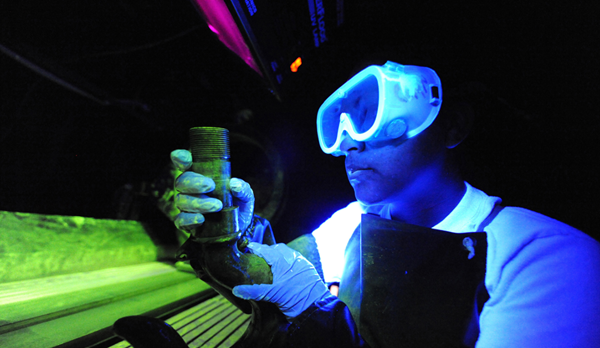Air Force Nondestructive Inspection (2A7X2) specialist have the responsibility of identifying any potential defects in systems and equipment.
The tasks that these specialist perform relate to preventative maintenance; taking the necessary measures to make sure equipment is working safely.
Nondestructive Inspection (NDI) specialist use noninvasive methods combined with different types of equipment to find issues before they become a larger, dangerous problem.
Related Article – Air Force Jobs List: A List Of All AFSC’s In The Air Force
Education, Qualifications and Training
This position has very basic requirements.
You do not need a formal education (besides High School) or training in order to join the Air Force and get into Nondestructive Inspection.
Education
Individuals must have a High School Diploma or GED to enter.
They must also meet the Mechanical requirements on the ASVAB test.
Qualifications
Individuals in this position must:
- Have normal color vision
- Be 18 years prior to the entry of technical school
- Be less than 39 years old
Training
Enlisted airmen will attend Basic Military Training for 8.5 weeks.
Upon completion of Basic Training they will go to Technical Training in Pensacola NAS in Florida for 49 days.
Related Article – Air Force Grooming Standards: Haircuts, Mustaches, Beards, And More
What does an Air Force Nondestructive Inspection Specialist do?
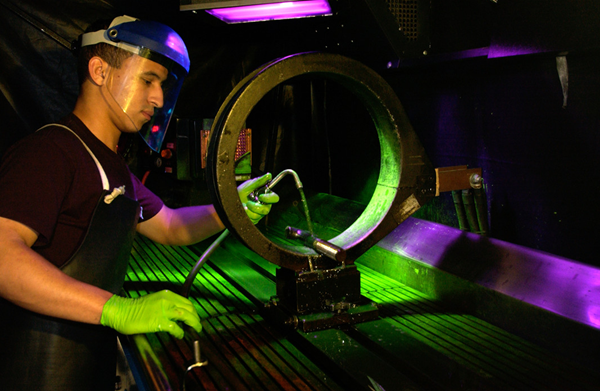
A Nondestructive Inspection specialist will perform any necessary steps and procedures to find any possible defects.
These defects are often not visible to the naked eye and the noninvasive procedures are meant to not cause any destruction or damage to the equipment or part when the inspection is performed.
This position requires patience, diligence and precision.
NDI specialist will inspect aerospace weapons systems components and support equipment to find any structural integrity issues.
They can be in charge of inspecting metal engine parts for wear and tear.
Specialist also inspect to ensure lubricating oil and other fluids are not seeping into any cracks or holes.
Prior to beginning an inspection, Nondestructive Inspection specialist will determine the best test method for the equipment or part.
They will prepare the fluids, parts and equipment needed to perform the inspection.
The goal is to detect any flaws, cracks, voids, delaminations, processing defects or heat damage using different types of equipment.
NDI specialist will use x-rays, ultrasound machines, penetrant, magnetic particle, radiographic, eddy current, and optical equipment to find any any issues.
After completing the inspection, the specialist will examine and interpret any results.
When issues are found, they will advise and make recommendations to the repair center.
They will examine an engine and other components for metallurgical properties including alloy, temper, conductivity and other factors.
Specialist will also perform radiation testing.
They will test the wear metal content on engine lubricating oil and other fluids.
During radiation testing they will compute and monitor personal exposure areas for any radiographic operations.
The importance of this is to ensure that the levels are in a safe range for any Air Force personnel.
If any lubricants or oils are outside of a safe range, NDI specialist will make a recommendation on the issue and possibilities to resolve the issue.
NDI specialist compute and monitor personal exposure areas for radiographic operations and monitors all personnel exposure data.
Any maintenance or service required on shop equipment and tools will be performed by Nondestructive Inspection specialist.
When conducting any maintenance on equipment, NDI specialist will follow lock out and tag out procedures according to all safety guidelines.
Any hazardous waste or hazardous materials that are produced or found will be disposed of by NDI specialist.
Related Article – Air Force Radar, Airfield & Weather Systems (1C8X3): Career Profile
What is the Pay for a Nondestructive Inspections specialist?
Your pay in the Air Force will be determined by your rank and years of service.
You rank will be determined by a few different factors that include education and experience.
Upon joining the Air Force you can expect to (generally) be at an E1 with no experience/education and receive a base pay of around $1600.
The pay table below can give you an idea of how an individual can progress.
| Insignia | Pay Grade | Rank | Abbreviation | 2023 Minimum Monthly Pay |
|---|---|---|---|---|
| E-1 +4 months | Airman Basic | AB | $1,917.60 | |
| E-2 | Airman | Amn | $2,149.20 | |
| E-3 | Airman First Class | A1C | $2,259.90 | |
| E-4 | Senior Airman | SrA | $2,503.50 | |
| E-5 | Staff Sergeant | SSgt | $2,730.30 | |
| E-6 | Technical Sergeant | TSgt | $2,980.50 | |
| E-7 | Master Sergeant | MSgt | $3,445.80 | |
| E-8 | Senior Master Sergeant | SMSgt | $4,957.20 | |
| E-9 | Chief Master Sergeant | CMSgt | $6,055.50 | |
| E-9 | Command Chief Master Sergeant | CCM | $6,055.50 | |
| E-9 | Chief Master Sergeant Of The Air Force | CMSAF | $6,055.50 |
Benefits
In addition to the pay table above, take into consideration that while living both on and off base, there are benefits that make up for the amount of pay.
Recruits are considered enrolled in the Community College of the Air Force from day one.
In the Nondestructive Inspections position they begin earning credits towards Nondestructive Testing Technology.
As an airmen you can also receive up to 100% tuition assistance with the Air Force Tuition Assistance program, the Post 9/11 GI Bill and the Montgomery GI Bill.
Individuals who live on base will receive a housing allowance that includes utility cost and maintenance.
If you live off of the base you will receive a housing allowance based on rank, family status and location.
Food allowances are also available.
Other benefits include:
- 30 days vacation
- Retirement after 20 years
- Recreational access
- Paid sick time
- Health and Dental Insurance
You can find a complete list of benefits and details here.
Job Reviews
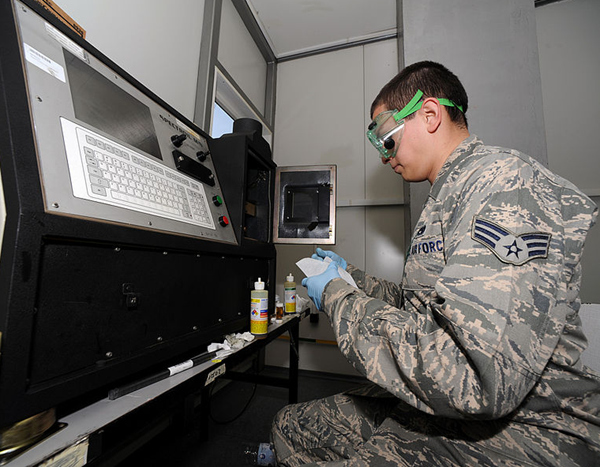
When looking at reviews online (Reddit, Glassdoor, Indeed, etc) from individuals who have been in this position, they indicate that having the ability to travel is a major benefit of this position.
They also indicate that there are long hours and it can be hard to find a work/home balance.
Some individuals state that the work is challenging and engaging while others state that it becomes predictable.
This would likely depend on the location you are working in.
You can find a few reviews from NDI specialist below.
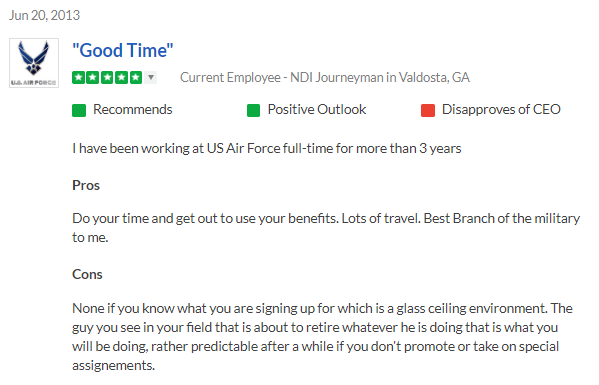
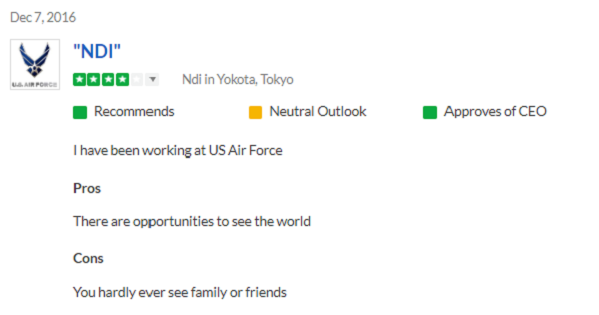
Civilian Career Opportunities
Civilian positions that related to the Air Force Nondestructive Inspection specialist job includes a few different fields.
Individuals can get into radiography, rail, aircraft, manufacturing, transportation and more.
Specific job titles relating to NDI include:
- Non-Destructive Testing Technician
- Engineer Technician-NDT
- NDT (trainee, manager, supervisor, leader, level I, II, etc)
- Non Destructive Radiographic Assistant
- Metallurgist
- Quality Manager
- Quality Control Inspector
Individuals who work in these fields or specific job titles can work for a variety of public and private businesses.
The salary range varies between trainee (around $40,000 annually) to management/higher level positions at over $100k annually.
Related Article – Air Force Aerospace & Operational Physiology (4M0X1): Career Details
Summary
Air Force Nondestructive Inspection specialist ensure that all aircraft parts are free from hidden cracks or other issues.
These individuals use various equipment and inspection methods to find the defects you would not be able to see with your eyes.
This is an entry level Air Force position with basic requirements.
After you join you can expect to attend Basic Training and technical training.
You will have access to base pay and excellent benefits.
Individuals who have previously held this position generally recommend it as a career path.
After leaving the Air Force, the skills learned will open the door to many civilian career opportunities related to non-destructive testing.
Reference:
Air Force Nondestructive Inspection
- Ikon Pass Military Discount: Learn How To Save Big - January 31, 2025
- RTIC Military Discount: Find Out How To Save Big on Gear - January 30, 2025
- Traeger Military Discount: Learn How To Save Big on Smokers - January 28, 2025

